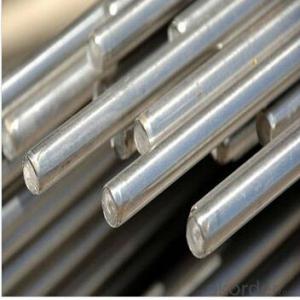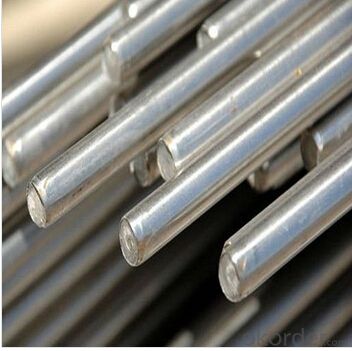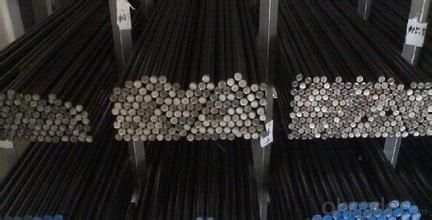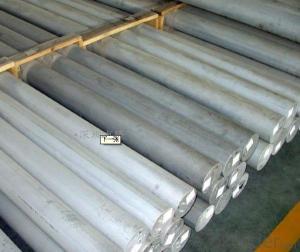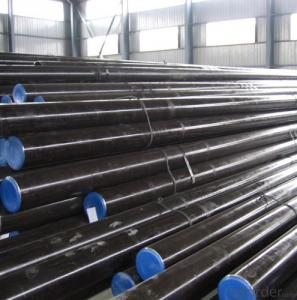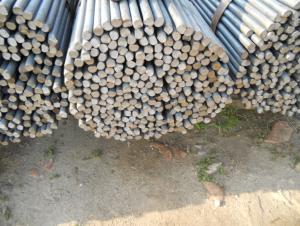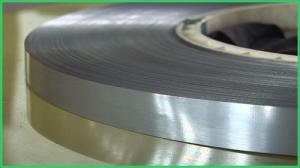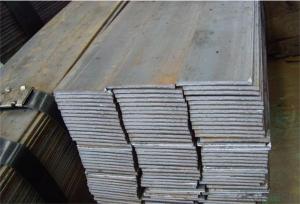Spring Steel Round Bar
- Loading Port:
- China Main Port
- Payment Terms:
- TT or LC
- Min Order Qty:
- -
- Supply Capability:
- -
OKorder Service Pledge
OKorder Financial Service
You Might Also Like
Quick Details:
Name: stainless steel bar
Place of Origin:Liaoning,China
Shape: round , square, hexagonal bar
Size: diameter:10-600mm,side length: 10-600mm ,also custom-made
Application: used in making gear, crankshaft, trestle, hinge, oil tank, and cream pitcher etc.
Packing&Delivery:
Packaging details: According to customer's require or export's standard
Delivery Time: In 30days after we receive 30% deposite
Port: Dalian
MOQ: 1TON
Standard:
| ASTM | USA | Ameirican Society of Mechanical Engineers |
| AISI | USA | Acronym of American Iron and Steel Institute |
| JIS | JP | Japanese Industrial Standards |
| DIN | GER | Deutsches Institut für Normung e.V. |
| UNS | USA | Unified Numbering System |
FAQ of Spring Steel Round Bar:
①How is the quality of your products?
Our products are manufactured strictly according to national and internaional standard, and we take a test on every bar before delivered out. If you want see our quality certifications and all kinds of testing report, please just ask us for it.
Guaranteed: If products’ quality don’t accord to discription as we give or the promise before you place order, we promise 100% refund.
②How about price?
Yes, we are factory and be able to give you lowest price below market one, and we have a policy that “ for saving time and absolutely honest business attitude, we quote as lowest as possible for any customer, and discount can be given according to quantity”,if you like bargain and factory price is not low enough as you think, just don’t waste your time.Please trust the quotation we would give you, it is professional one.
③Why should you chose us?
Chose happens because of quality, then price, We can give you both.Additionally, we can also offer professional products inquiry, products knowledge train(for agents), smooth goods delivery, exellent customer solution proposals.Our service formula: good quality+good price+good service=customer’s trust
SGS test is available, customer inspection before shipping is welcome, third party inspection is no problem.
Any question, pls feel free to contact us !
Spring Steel Round Bar Images
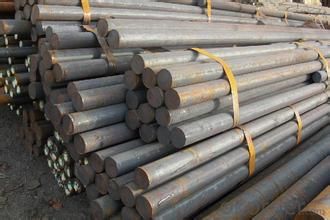
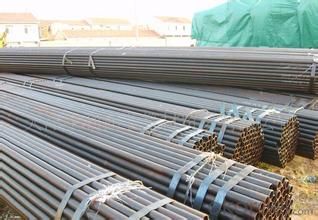
- Q: How does special steel contribute to the heavy equipment industry?
- Special steel contributes to the heavy equipment industry by offering enhanced strength, durability, and resistance to wear and tear. It enables the production of high-performance components and parts, such as gears, axles, and blades, that can withstand heavy loads, extreme temperatures, and harsh environments. The use of special steel in heavy equipment ensures improved safety, increased productivity, and longer service life, making it a critical material for the industry.
- Q: What are the main factors affecting the hardness of special steel?
- The main factors affecting the hardness of special steel include the composition of the steel, the heat treatment process, the grain size of the steel, and the presence of impurities or inclusions.
- Q: What are the requirements for special steel used in high-performance racing cars?
- In order to meet the demands of the racing environment, the requirements for special steel used in high-performance racing cars are quite strict. Some of the main requirements include: 1. Exceptional strength and durability: The special steel must possess outstanding strength and durability to endure the extreme loads and stresses encountered during high-speed racing. It must have a high tensile strength and the ability to withstand fatigue and deformation under intense conditions. 2. Lightweight: Racing cars require lightweight materials to achieve optimal performance and maneuverability on the track. The special steel used in high-performance racing cars must have a high strength-to-weight ratio, allowing for reduced weight without compromising strength or safety. 3. Excellent heat resistance: The steel must have excellent heat resistance to withstand the high temperatures generated by high-performance engines, braking systems, and exhaust systems. It must maintain its structural integrity and mechanical properties even under extreme heat conditions. 4. High corrosion resistance: Racing cars are often exposed to harsh environments, including moisture, salt, and other corrosive elements. Therefore, the special steel used in racing cars should have high corrosion resistance to prevent rust and degradation, ensuring the longevity and reliability of the components. 5. Easy machinability: The steel should be easily machinable, facilitating the precise manufacturing and fabrication of complex components. This ensures that the parts can be produced accurately and efficiently, resulting in superior performance and reliability. 6. Good weldability: The special steel used in racing cars should have good weldability, as welding is often required for the assembly of various components. It should be able to withstand the heat generated during welding without experiencing significant loss in strength or other mechanical properties. In summary, the requirements for special steel used in high-performance racing cars revolve around strength, lightweight, heat resistance, corrosion resistance, machinability, and weldability. Meeting these requirements is essential to ensure the safety, performance, and success of racing cars on the track.
- Q: How does special steel compare to other materials?
- Special steel, known as alloy steel as well, possesses outstanding strength, durability, and resistance to wear and corrosion. When compared to regular steel, aluminum, and plastic, special steel stands out due to its superior mechanical properties. To begin with, special steel offers higher tensile strength and hardness, making it perfect for applications that require heavy-duty performance. Its ability to withstand high pressures and temperatures, as well as resistance to deformation, make it suitable for industries like aerospace, automotive, and construction. Furthermore, special steel has excellent wear resistance, making it suitable for applications that endure friction, abrasion, and impact. This characteristic reduces the need for frequent repairs or replacements, resulting in cost savings and improved efficiency. When it comes to corrosion resistance, special steel surpasses regular steel, which tends to rust when exposed to moisture or aggressive environments. The presence of elements like chromium, nickel, and molybdenum in its composition creates a protective layer on the surface, preventing corrosion and extending the lifespan of the material. Compared to materials like aluminum and plastic, special steel has the advantage of being more robust and less prone to deformation or breakage. While aluminum is lightweight, it lacks the strength and hardness of special steel, limiting its suitability for heavy-duty applications. On the other hand, plastic offers lower strength and durability compared to special steel, making it less appropriate for demanding tasks. Moreover, special steel can be easily machined, fabricated, and welded, allowing for versatile applications across various industries. Its flexibility in terms of shaping and forming makes it the preferred choice in the manufacturing of components and structures. In conclusion, special steel outperforms other materials in terms of strength, durability, wear resistance, corrosion resistance, and versatility. Its exceptional properties make it an essential material in demanding industries where reliability and performance are of utmost importance.
- Q: How is carbon steel used in the manufacturing of pipes and tubes?
- Carbon steel is commonly used in the manufacturing of pipes and tubes due to its high strength, durability, and affordability. Its composition, which includes mainly iron and carbon, provides it with excellent mechanical properties and resistance to corrosion. Carbon steel pipes and tubes are widely used in various industries, including oil and gas, construction, and manufacturing, for conveying fluids, gases, and solids. Its versatility and reliability make it a popular choice for a wide range of applications.
- Q: What are the different surface cleaning methods used for special steel?
- There are several surface cleaning methods used for special steel, including mechanical cleaning, chemical cleaning, and electrochemical cleaning. Mechanical cleaning involves the use of abrasive tools or equipment to remove dirt, rust, or other contaminants from the surface. Chemical cleaning involves the use of chemicals, such as acids or solvents, to dissolve or remove contaminants. Electrochemical cleaning utilizes an electrical current to remove contaminants and improve the surface finish. Each method is chosen based on the specific requirements and condition of the special steel being cleaned.
- Q: Can special steel be used in the production of kitchen utensils?
- Yes, special steel can be used in the production of kitchen utensils. Special steel is a term used to describe steel alloys that have specific properties and characteristics, such as resistance to corrosion, high strength, and durability. These properties make special steel suitable for various applications, including the production of kitchen utensils. Kitchen utensils need to withstand regular use, exposure to water, and high temperatures. Special steel, such as stainless steel, is commonly used in the production of kitchen utensils due to its corrosion resistance and ability to withstand heat. Stainless steel utensils are known for their durability, resistance to rust, and ease of cleaning. In addition to stainless steel, there are other types of special steel that can be used in the production of kitchen utensils. For example, high carbon steel is commonly used in the production of chef knives due to its ability to maintain a sharp edge and its strength. Titanium-coated steel utensils are also available, providing additional benefits such as non-stick properties and enhanced durability. Overall, special steel is a versatile material that can be used in the production of a wide range of kitchen utensils. Its properties make it an excellent choice for manufacturers looking to produce durable and high-quality products that can withstand the demands of everyday use in the kitchen.
- Q: Can special steel be used in the paper manufacturing industry?
- Yes, special steel can be used in the paper manufacturing industry. It is commonly used for the construction of machinery and equipment such as rollers, blades, and cutting tools, due to its high strength, durability, and resistance to wear and corrosion. Special steel can also be used for the production of paper mill rolls, which are essential for the processing and production of paper.
- Q: What are the different methods for tempering special steel?
- There are several different methods for tempering special steel, including air tempering, oil tempering, water tempering, and salt bath tempering. Air tempering involves heating the steel to a specific temperature and then allowing it to cool in air. Oil tempering involves heating the steel to a specific temperature and then quenching it in oil. Water tempering is a similar process, but the steel is quenched in water instead. Salt bath tempering involves heating the steel in a molten salt bath to achieve the desired tempering temperature. Each method has its own advantages and is chosen based on the specific properties and requirements of the steel being tempered.
- Q: How does special steel contribute to the railway industry?
- Special steel plays a crucial role in the railway industry by contributing to the development and maintenance of efficient and reliable rail systems. The unique properties of special steel, such as high strength, durability, and resistance to wear and tear, make it an ideal material for various components and structures within the railway infrastructure. One of the key areas where special steel contributes to the railway industry is in the manufacturing of rails. Special steel rails are designed to withstand heavy loads and intense usage, ensuring the safe and smooth movement of trains. These rails are highly resistant to wear, fatigue, and deformation, resulting in longer service life and reduced maintenance costs. Additionally, special steel is used in the manufacturing of wheelsets, which are critical components of trains. The high strength and durability of special steel make it ideal for wheelset production, ensuring reliable performance and minimizing the risk of derailments. The use of special steel in wheelsets also contributes to increased operational efficiency, as it reduces friction and enhances energy transmission, leading to improved fuel economy and reduced environmental impact. Furthermore, special steel is utilized in the construction of bridges, tunnels, and other infrastructure elements within the railway network. These structures must withstand heavy loads, extreme weather conditions, and various environmental factors. Special steel's exceptional strength, corrosion resistance, and longevity make it a preferred choice for such applications, ensuring the safety and reliability of rail systems. In summary, special steel significantly contributes to the railway industry by providing the necessary strength, durability, and resistance to wear and tear for various components and structures. Its use in rails, wheelsets, and infrastructure elements enhances the efficiency, reliability, and safety of rail systems, ultimately benefiting passengers, freight transport, and the overall transportation sector.
Send your message to us
Spring Steel Round Bar
- Loading Port:
- China Main Port
- Payment Terms:
- TT or LC
- Min Order Qty:
- -
- Supply Capability:
- -
OKorder Service Pledge
OKorder Financial Service
Similar products
Hot products
Hot Searches
Related keywords
